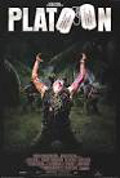
Directed by
Oliver Stone
120 minutes
Rated M
Reviewed by
Bernard Hemingway

Platoon
This grunt's-eye view of the Vietnam war, based on director Oliver Stone’s own experiences (portrayed by Charlie Sheen in a role that had been offered to James Woods, Sheen's older brother, Emilio Estevez, and Kyle MacLachlan) took Best Picture and for Stone, Best Director, at the Academy Awards, as well as Best Editing and Sound and was a box office hit for Hemdale, the production company which had lost money the previous year with Stone's Salvador.
Eschewing the grand style of Coppola's Apocalypse Now 1979 icon (which starred Charlie Sheen's father, Martin) Stone is more interested in depicting the day-to-day realities of the Vietnam war. He uses the character of an callow, middle-class college drop-out Chris (Charlie Sheen) as a device to articulate his thoughts on the experience of the war via an intermittent narration that, like the dialogue, occasionally lapses into the literary and in general does the usual disservice of distancing one from what is seen on-screen.
Dedicated to the men who fought in Vietnam, for all its intensity structurally the film plays very much along conventional narrative lines, on the one hand overtly demonstrating the insanity of war but also tending to indulge in Rambo-like machismo, particularly in the character of Sgt Elias (Willem Dafoe) and later, in the ultimate battle sequence, with Sheen’s character who makes the transition from rookie to vet with surprising rapidity.
Aside from the convincing look of the film, which was shot in The Philippines, and well-staged battle sequences, the candid representation of the grunts is the film’s strong point with Tom Berenger truly menacing as the embittered Sgt. Barnes. Dramatically, however, the film lacks somewhat in broader appeal, only the relationship between Chris and Sgt Elias receiving much attention, many of the other characters (including one played by Johnny Depp in one of his earliest screen appearances) being largely indistinguishable, although that is arguably true to its subject.
Want something different?





